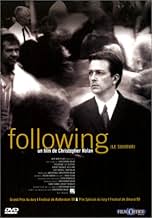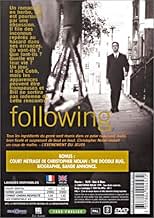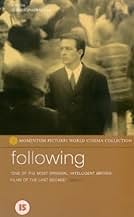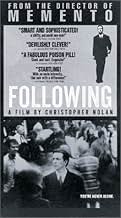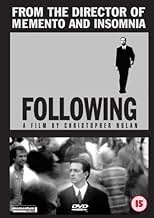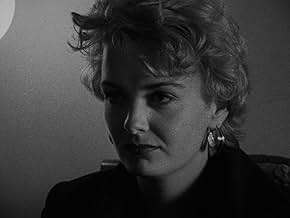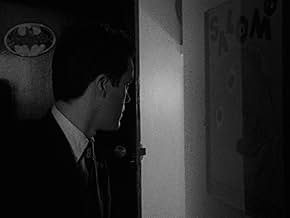Un jeune écrivain qui suit des inconnus pour trouver de l'inspiration, rencontre un voleur qui le prend sous son aile.Un jeune écrivain qui suit des inconnus pour trouver de l'inspiration, rencontre un voleur qui le prend sous son aile.Un jeune écrivain qui suit des inconnus pour trouver de l'inspiration, rencontre un voleur qui le prend sous son aile.
- Réalisation
- Scénario
- Casting principal
- Récompenses
- 5 victoires et 4 nominations au total
Avis à la une
I just finished watching Following and I thought it was great. I rated it 8 out of 10. I plan on watching it again with the director's commentary and then again in chronological order.
I rented this movie because of my fascination of Christopher Nolan's more recent movie Memento. Following has some similarities; this movie was probably the blueprint for Memento. Even the music in some parts is very similar.
Shooting the movie in black and white gives it a mysterious feel. The story and dialogue is really good. The performance of the actors is believable.
Christopher Nolan made this movie on a really low budget. I look forward to his next release Insomnia, a big budget movie with my favourite actor Al Pacino.
I rented this movie because of my fascination of Christopher Nolan's more recent movie Memento. Following has some similarities; this movie was probably the blueprint for Memento. Even the music in some parts is very similar.
Shooting the movie in black and white gives it a mysterious feel. The story and dialogue is really good. The performance of the actors is believable.
Christopher Nolan made this movie on a really low budget. I look forward to his next release Insomnia, a big budget movie with my favourite actor Al Pacino.
In this intriguing noir thriller (looking like the Forties, but with a psychology befitting the Nineties), Director Christopher Nolan employs a number of techniques he would perfect in his internationally acclaimed Memento (2000), most notably scenes presented out of time sequence for effect, and a naive protagonist taken advantage of by others. The film opens with "Bill, the Innocent" (as I might dub him), played by Jeremy Theobald, trying to explain to someone, perhaps a social worker, perhaps even a police inspector (John Nolan), why he took up following people just for the fun of it. He doesn't just follow women, he points out. He's not a stalker, as such. He's just curious. He's an intriguing and sympathetic character, a Brit writer with a lot of time on his hands who seems something of a throwback to an earlier age with his clanking manual typewriter and the photo of a pursed-lips Marilyn Monroe on the wall of his shabby apartment. Things began to go wrong for him, he further explains, when he broke some of his "following rules" and got too close to his prey. What he doesn't know and what we don't know yet, is that his clumsy following technique has allowed him to unwittingly become the followed himself. Enter a juicy blonde (Lucy Russell) walking down some steps from her apartment. (This scene is out of sequence as far as chronological time goes, but psychologically speaking, her appearance signals his entanglement). Enter now a scheming, sophisticated psychopathic thrill-seeker named Cobb (Alex Haw) who entices Bill with his (apparent) practice of burglary just for the powerful feeling one gets from invading the sanctity of another's life. Although justification for the temporal inversions here is not as clearly established as in Memento, nonetheless the technique works well, and Nolan provides us with a clever ending that sneaks up on us and makes in a few seconds all that went before clear. Or mostly clear. You might want to rewind and view the first few minutes of the film, and then everything should be clarity. This low-budget, black and white, deliciously ironic little film (71 minutes) marked the auspicious debut of a film maker who has already made quite a name for himself, not only with the aforementioned Memento, but with Insomnia (2002). It will be interesting to see what Nolan does next.
The debut that plucked from obscurity one of the brighter stars of contemporary noir is an assured, if limited, stab at the con game and obsession. Filmed for zero money, Nolan couldn't have chosen a better subject than the drab and seamy underside of London to ply his trade, given the lack of funds. This short (67 min) is at its best in playing with the audience's and protagonist's expectations about who is scamming whom, though the initial set-up does ring some alarm bells in the credibility dept. The muddy cinematography (he often used natural lighting due to budget) can be mostly chalked up to noir stylization, though the limitations do show at times.
One can easily see Nolan's style developing in this fledgling effort; many of the same themes of blurred identity and expectation smashing recur in MEMENTO and INSOMNIA. Not a masterpiece but good and certainly worth a look for modern noir and Nolan fans.
One can easily see Nolan's style developing in this fledgling effort; many of the same themes of blurred identity and expectation smashing recur in MEMENTO and INSOMNIA. Not a masterpiece but good and certainly worth a look for modern noir and Nolan fans.
Saucy, eh ? If at all you're familiar with Christopher Nolan's style of film-making, watching this will at once make you realize where it all started. Its also of course possible that it began much before this but since much of that material isn't accessible to the public (save Doodlebug), we'll never really know. For all purposes, Following remains Nolan's feature film debut and it surely is a remarkable achievement.
The story follows Bill, a struggling unemployed writer who takes a liking to following people in hopes of finding material to write about. This liking soon turns into addiction forcing Bill to set rules to allow him to restrain his activities. One of the rules which he ends up breaking, is following the same person twice. The person with whom this rule is broken is Cobb, who soon confronts Bill about being followed. As it turns out, Cobb is a burglar who enjoys robbing people, not for the money, but rather for the sheer pleasure in taking away things that people took for granted; his belief being that it would make them realize what they had. Taken away by Cobb's lifestyle, Bill becomes a partner in his burglaries which is where the trouble begins.
Digging any more into the plot would serve to spoil the complex mystery that Following is. Following has a lot of those narrative structures that would become trademarks of Nolan's directorial style (intercuts, close-up inserts, non-linear editing, multiple chronologies, and so on). Nolan and crew were forced to make certain hard choices to obscure the severely limited budget, one of which was shooting the film in black and white. Of course, the plot was such that these decisions worked the film's favor. The film's incredible naturalism repeatedly comes to mind while watching the film. This is due largely in part to the film being shot hand-held, with scenes filmed in a take or two to save on film stock. The behind the scenes material with the film reveals this and other fascinating details about the film's production such as the crew shooting over weekends due to their jobs on weekdays as a result of which the film took a year to complete.
Despite the low budget, you're always hooked on to Following and that is due largely in part to the film's plot and tight writing (another of Nolan's strengths). Unlike many filmmakers who use lavish editing styles and gimmicky display effects, Nolan's films rely primarily on story and screenplay to get the viewers attention (with the occasional non-linear editing thrown in to really keep the audience alert at all times). Add to it, the intriguing characters which have personalities so distinct it appears Nolan himself followed a handful of people to get the traits right. Jeremy Theobald is as natural as the gullible Bill as Alex Haw is suave in the role of Cobb. And the chemistry between the two is so natural, it makes most of the dialogues they say seem improvised, as though real people were conversing.
Following is a great start for Nolan who has now moved on to bigger, elaborate and definitely better projects. It is a lesson for aspiring filmmakers that even with a limited budget, it is possible to make a feature as interesting, riveting and thrilling as some of the best noirs of the early 40s. While it may not be perfect, most of the limitations it suffers from are largely due to production values rather than plotting and pacing. It is nevertheless, a must watch for anyone who has even the slightest of respect for Christopher Nolan's film-making.
Overall Score: 7.0 / 10
The story follows Bill, a struggling unemployed writer who takes a liking to following people in hopes of finding material to write about. This liking soon turns into addiction forcing Bill to set rules to allow him to restrain his activities. One of the rules which he ends up breaking, is following the same person twice. The person with whom this rule is broken is Cobb, who soon confronts Bill about being followed. As it turns out, Cobb is a burglar who enjoys robbing people, not for the money, but rather for the sheer pleasure in taking away things that people took for granted; his belief being that it would make them realize what they had. Taken away by Cobb's lifestyle, Bill becomes a partner in his burglaries which is where the trouble begins.
Digging any more into the plot would serve to spoil the complex mystery that Following is. Following has a lot of those narrative structures that would become trademarks of Nolan's directorial style (intercuts, close-up inserts, non-linear editing, multiple chronologies, and so on). Nolan and crew were forced to make certain hard choices to obscure the severely limited budget, one of which was shooting the film in black and white. Of course, the plot was such that these decisions worked the film's favor. The film's incredible naturalism repeatedly comes to mind while watching the film. This is due largely in part to the film being shot hand-held, with scenes filmed in a take or two to save on film stock. The behind the scenes material with the film reveals this and other fascinating details about the film's production such as the crew shooting over weekends due to their jobs on weekdays as a result of which the film took a year to complete.
Despite the low budget, you're always hooked on to Following and that is due largely in part to the film's plot and tight writing (another of Nolan's strengths). Unlike many filmmakers who use lavish editing styles and gimmicky display effects, Nolan's films rely primarily on story and screenplay to get the viewers attention (with the occasional non-linear editing thrown in to really keep the audience alert at all times). Add to it, the intriguing characters which have personalities so distinct it appears Nolan himself followed a handful of people to get the traits right. Jeremy Theobald is as natural as the gullible Bill as Alex Haw is suave in the role of Cobb. And the chemistry between the two is so natural, it makes most of the dialogues they say seem improvised, as though real people were conversing.
Following is a great start for Nolan who has now moved on to bigger, elaborate and definitely better projects. It is a lesson for aspiring filmmakers that even with a limited budget, it is possible to make a feature as interesting, riveting and thrilling as some of the best noirs of the early 40s. While it may not be perfect, most of the limitations it suffers from are largely due to production values rather than plotting and pacing. It is nevertheless, a must watch for anyone who has even the slightest of respect for Christopher Nolan's film-making.
Overall Score: 7.0 / 10
Christopher Nolan's first directorial effort, a year before he did "Memento," and this is almost as brilliant as that classic. He uses time differentials in a similar manner to tell his story, and it's a very clever one.
Bill is this young writer who begins following complete strangers around just to see where they live and what they're all about. One day, he follows this man, Cobb, who turns the tables and confronts Bill, who breaks down and confesses what he's up to.
Cobb is a burglar and he takes Bill along on a few jobs to teach him the ropes. Both men are voyeurs of a sort and a bond begins to grow between the two of them.
But there's an ulterior motive for Cobb nurturing this relationship, and it all ties in very smartly at the end. No, I won't spoil it but this is a very cool movie and I'm beginning to think Christopher Nolan is a genius.
If you like suspense films with surprise endings, this one is a must see.
Bill is this young writer who begins following complete strangers around just to see where they live and what they're all about. One day, he follows this man, Cobb, who turns the tables and confronts Bill, who breaks down and confesses what he's up to.
Cobb is a burglar and he takes Bill along on a few jobs to teach him the ropes. Both men are voyeurs of a sort and a bond begins to grow between the two of them.
But there's an ulterior motive for Cobb nurturing this relationship, and it all ties in very smartly at the end. No, I won't spoil it but this is a very cool movie and I'm beginning to think Christopher Nolan is a genius.
If you like suspense films with surprise endings, this one is a must see.
Le saviez-vous
- AnecdotesSir Christopher Nolan never studied film-making at university. He studied English Literature at University College London, and used the film society there to shoot the opening dialogue scene between Bill and the policeman.
- GaffesDuring the safe robbery, Bill is clearly shown wearing gloves, most noticeably when he pulls the paper with the combination from his pocket. However, as he starts to open the safe, the gloves are gone and they never reappear.
- Crédits fousThe movie was filmed from 1996 to 1997 and first released in 1998. However, the copyright date in the credits is listed as being 1999.
- Versions alternativesThe Criterion Collection DVD features an additional "Chronological Edit" of the film, which places the scenes in linear order.
- ConnexionsFeatured in Smashing UK Top 10: Top 10 Film Directors (2013)
Meilleurs choix
Connectez-vous pour évaluer et suivre la liste de favoris afin de recevoir des recommandations personnalisées
- How long is Following?Alimenté par Alexa
Détails
Box-office
- Budget
- 6 000 $US (estimé)
- Montant brut aux États-Unis et au Canada
- 48 482 $US
- Montant brut mondial
- 126 052 $US
- Durée1 heure 9 minutes
- Couleur
- Mixage
- Rapport de forme
- 1.37 : 1
Contribuer à cette page
Suggérer une modification ou ajouter du contenu manquant

Lacune principale
What was the official certification given to Following - Le suiveur (1998) in Australia?
Répondre

